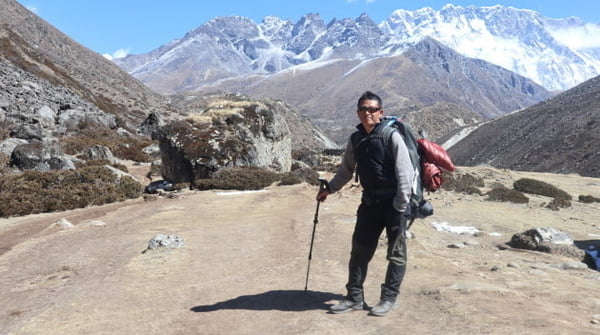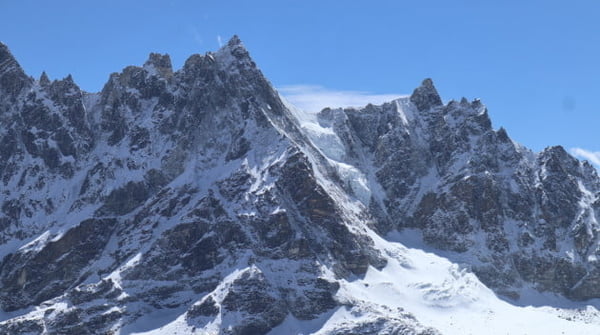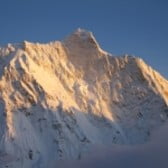
Daily Mountain
48 years, Australia
In Nepal, Sherpas are losing vital tourism income, but 'stopping the virus is more important than our jobs'
This article first appeared on http://www.thejournal.ie. The original can be read here.
Saban Rai walked through snow towards the village of Dingboche near to the foot of Mount Everest in Nepal, 4,410 metres above sea level.
 Saban Rai, Source: Cormac Fitzgerald
Saban Rai, Source: Cormac Fitzgerald
Rai lives about an eight-hour walk from Dingboche in Namche Bazaar, a bustling market town that serves as the unofficial entrance to most of the treks in Sagarmatha National Park in Khumbu, also known as the Everest region, in the north east of the country.
Trekkers on their way up usually stop off there to acclimatise for a day or two and to pick up some last-minute supplies.
Rai has worked as a guide for 10 years, helping to bring people to Everest Base Camp, where treks up the mountain begin, through the Three Passes trekking route or across the other popular trails that crisscross the region.
Business varies from season to season and Rai has had good years and bad years. In 2018, he was busy with work, with many tourists visiting the country. Last year, he said bad weather conditions meant a drop off in numbers. This year is set to be one of his worst.
“Three years ago I made good money here, there were many tourists, last year was not so good. This year has been very quiet, only two tourists so far,” Rai said as he walked.
“This year there are not many tourists because of coronavirus.”
Problems
Novel coronavirus (Covid-19) is sweeping across the world, with over 280,000 people currently infected and over 11,000 deaths.
The virus was first detected in China, but Europe is now considered to be the epicentre of the outbreak, with Italy, Spain and Germany among the worst-hit countries.
There are 683 cases in Ireland as of Friday, and the country has gone into a near lockdown, with pubs, schools and childcare centres all closed for at least the next two weeks and large social gatherings called off.
In Nepal and other south Asian countries,the virus has not spread as it has in Europe. As of Friday, Nepal had just two confirmed case of coronavirus – one of which has been treated and healed.
There are fears among health experts that the virus may catch on in countries in south Asia and spread rapidly due to issues around overcrowding and the difficulty of enforcing “social distancing” practices which are being used in Europe.
However, for now, the Nepalese economy is already suffering significantly from coronavirus due to an initial slowdown followed by a complete halt to tourists coming into the country.
Business was slower than normal at the beginning of the year, but this worsened last week when the Nepalese government announced it was stopping issuing tourist visas for people entering the country in an attempt to halt the spread of the virus.
All Mount Everest climbing expeditions – which usually take place in May during the brief window when weather conditions make climbing to the top possible – have been cancelled, dealing a huge blow to local employment.
Tourism is hugely important to the Nepalese economy, with the government’s decision set to significantly impact the livelihoods of hundreds of thousands of people who rely on tourism and trekking to make their living.
 Source: Cormac Fitzgerald
Source: Cormac Fitzgerald
Tourism and Nepal
Nepal is a landlocked country of just over 29 million people squeezed in between India and China. It is just under twice the size of Ireland, but has a breathtaking topographical and geographical diversity, from the lowland tropical plains of the southern terai to the towering Himalayan peaks of the north.
It is most famous for Mount Everest, which stands at 8,848 metres above sea level and is the highest mountain in the world. As well as this, the small country is home to eight of the 14 highest peaks in the world.
For decades, since Everest was first summited in 1953, tourists and mountaineers have flocked to Nepal to attempt to scale its mountains or to trek in the foothills around them. The local economies of these regions rely hugely on the income generated from these activities.
Nepal is one of the poorest countries in the world. According to data from the World Bank, over 30% of the population live on less than €2.90 a day. There are vast inequalities between different social groups and by geographical area.
A bloody Maoist insurgency was fought in the country from 1996 to 2006 and claimed the lives of over 17,000 people before a truce was declared, and the country is also very vulnerable to natural disasters and the effects of climate change. An earthquake in 2015 caused an estimated $10 billion in damage and killed nearly 9,000 people.
Despite the issues, there have been signs that the situation in the country has been improving somewhat in recent years, with a reduction in the percentage of the population living in extreme poverty.
The income generated from international and domestic tourism has also been increasing.
According to a report from the London-based World Travel and Tourism Council, in 2018 tourism was worth 240.7 billion Nepali rupees (€1.81 billion) to the economy and supported over a million jobs directly.
Spurred on by improving growth in the sector and an increase in domestic tourism, the Nepalese government launched the Visit Nepal 2020 campaign, with the aim of attracting 2 million tourists to the country this year.
The campaign got off to a bad start in January, with an avalanche in the Annapurna region claiming the lives of seven people (including four South Korean tourists), a bus crash killing two Chinese tourists, and eight Indian tourists suffocating in a guest lodge.
The spread of coronavirus in China in late January further damaged the campaign, which had hoped to attract hundreds of thousands of Chinese tourists. Last week, the campaign was effectively cancelled after the Nepalese government announced that it was halting all on-arrival visas for foreign tourists from 14 March until at least 30 April.
Local businesses hit
Earlier this month, before the Nepalese government announced it was putting a halt to visas, tourist numbers in Sagarmatha National Park were already significantly down on previous years.
Lodges in the small Sherpa communities and villages scattered about the park lay mostly empty, and the trails were much quieter than usual, according to local workers.
The national park covers an area of 124,400 hectares of rugged land in the north west of the country. It is made up of towering, snow-capped mountains, plunging valleys and rock-covered glaciers and lakes.
The area is a designated UNESCO world heritage site and is home to Mount Everest and many other well-known peaks.
According to official figures, In 2018 over 56,000 foreign tourists visited the park throughout the year, a jump of almost 7,000 on the previous year. Cut off from the rest of the country by a lack of proper roads, the region’s inhabitants rely on the money generated by tourism to make their living.
Any supplies, including food, fuel and any other products must be carried by porters or trains of donkeys or yaks to reach many of the region’s towns and villages.
Some villages have several lodges, with the majority lying empty in early March or with small numbers of tourists. Lodge owners and tour operators were hoping for an improvement when the spring tourism season kicked off properly in mid-March, but the ban on tourist visas means this won’t happen.
“Business is so, so. Less than last year,” said Ram Bahadur Tamang, the owner of the Moonlight Lodge in Dingboche earlier this month.
“People are saying it’s because of corona in Europe.”
Tamang (52) has lived in Dingboche for over 30 years and has operated a lodge for 17. He said the region has changed significantly in that time.
It’s changed a lot. People didn’t have any resources before, there were not many trekkers, now there are more trekkers. Sometimes, there are problems with the weather and things get slow and it becomes expensive.
And coronavirus is now a problem.
‘Everyone is suffering’
The announcement that the spring climbing season will not go ahead and the closure of Everest to expeditions this year is sure to hit the livelihoods and incomes of many Nepalese workers.
Last year, Mount Everest received the opposite attention after an image emerged showing a large queue as a crowd made their way to the peak. The Nepalese government came in for criticism for issuing too many trekking permits for the peak climbing season, and nine people died in total on the mountain from the Nepal side. Two more people died attempting the summit from the Tibet side.
Overcrowding will be the last of the trekking operators worries this year. Earlier this week in Thamel, the tourist district of the country’s capital Kathmandu, the streets and trekking stores were unusually quiet.
Restaurants and trekking shops had begun to lay off staff and very few tourists walked through the usually bustling area.
“We have now done almost 100% of our work now and we’re just waiting for our remaining clients to come down from the mountains,” Thaneshor Guragain, a manager at Seven Summits Trekking Agency told TheJournal.ie.
“We are now preparing for the [September-October] autumn season but this spring there will be no climbing.”
Guragain said that 70-80 Sherpa workers who rely on the agency for seasonal work were now returning to their villages.
We have no other choice… Sherpas came from villages looking for work, but now they will have no other income.
The lodge owners and Sherpas who work in the mountains, this is their only income. It’s a very tough time for them and they are suffering… I have no idea how they will survive, it will be very hard.
Guragain said, however, that he agrees with the decision made by the Nepalese government and that it is important to take action to stop the spread of coronavirus.
“The government must close the routes,” he said.
“The virus is much more dangerous and stopping it is more important than our jobs.”
He said he hoped that the issue would be solved before the Autumn season began.
“This is just a wish that autumn will be fine but I’m not sure how it will happen.”
“It is a terrible time,” he said.
For Saban Rai – the local guide – making a living to support his wife and young child this year looks unlikely. As he walked towards Dingboche, overlooked by the towering mountains of Amadablam and Nagarjun, he considered his future.
“Maybe I’ll go back to my hometown. My father has some cows… something like that and maybe start a vegetable farm,” he said.
“Many guides are in the same situation.”
This article is supported by the Simon Cumbers Media Fund.





